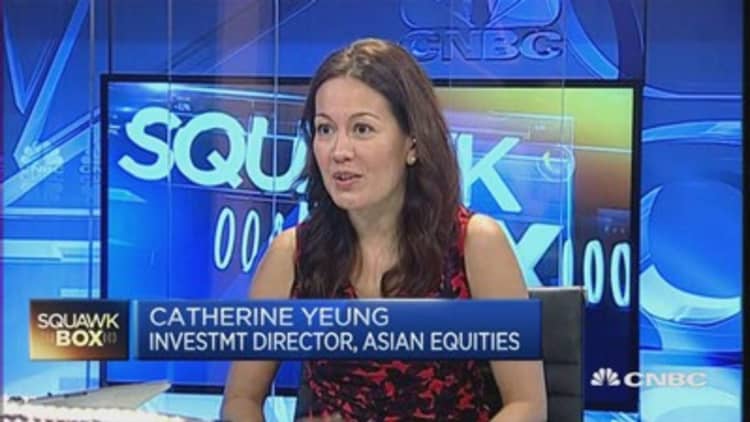Stock markets in China rode out a volatile session to settle at new seven-year peaks on Friday, while other bourses in the region nursed modest losses as a confluence of factors tempered risk appetite.
Lingering uncertainties over a Greek resolution, volatility in the European bond market, along with the closely-watched nonfarm payrolls report due in the U.S., made investors cautious. According to a poll by Reuters, the U.S. economy is expected to have added 225,000 jobs in May.
Investors are also awaiting the meeting of the Organization of the Petroleum Exporting Countries (OPEC) taking place in Vienna. While markets expect the 12-nation cartel to stand pat on its output levels, traders will be on the lookout for clues on where crude oil prices may be headed. In Asian trade, crude oil prices stabilized in cautious trading.
Overnight, U.S. stocks nursed a weaker finish as volatility in bonds and Greece kept investors on edge. The Dow Jones Industrial Average and the S&P 500 shaved off 0.9 percent each, while the tech-heavy Nasdaq closed down 0.8 percent.
Shanghai Comp up 1.5%
It was another extremely volatile day for China's Shanghai Composite index, which fell soon after breaching a key psychological level in the morning session. But the index eventually managed to climb back up 1.54 percent to end the week at a fresh seven-year high of 5,023.
The CSI300 index of the largest listed companies in Shanghai and Shenzhen moved up 0.95 percent, while Shenzhen's ChiNext board lost 0.9 percent.
In the previous session, the bourse witnessed huge swings, dropping more than 5 percent at one point following news that brokerage house Golden Sun Securities halted all margin financing on the start-up board Chinext.
Today, Citic Securities moved to tighten margin trading rules for the second time in less than a month.
Despite the volatility, Catherine Yeung, investment director of Asian equities at Fidelity Worldwide Investment, told CNBC the curbing of margin lending is a good thing for the stock market.
"It keeps a lid on the situation, like when Beijing released regulatory news regarding the umbrella trusts a few months ago. Ensuring the rally is underpinned is a different thing to changing the psyche of investor behavior," Yeung told CNBC.
Among gainers in Shanghai, property developers Poly Real Estate, China Vanke and Gemdale jumped between 2.7 and 5 percent.
Meanwhile, Hong Kong's Hang Seng index doubled losses in the afternoon session to ease 0.9 percent. Shares of British lender HSBC lost 1 percent after agreeing to pay 40 million swiss francs to settle allegations of money laundering at its Swiss private bank unit.

ASX sheds 0.1%
After a choppy session, Australia's benchmark S&P ASX 200 index ended down slightly in negative territory at a four-month low, and concluding its worst week in three years.
The index fell 4.8 percent this week amid a relatively data-heavy week for the Australian market, having received a better-than-expected growth report card for the first quarter, alongside dismal retail sales and trade data for April. Earlier in the week, the Reserve Bank of Australia (RBA) held interest rates steady at its monthly policy meeting.
The lift from firmer iron ore prices faded throughout the trading day. Fortescue Metals and Rio Tinto advanced 1.8 and 0.5 percent, respectively, but BHP Billiton closed down 0.7 percent.
Meanwhile, Recall Holdings is seeking to renegotiate a $2.2 billion deal to be acquired by Boston-based Iron Mountain, according to Australian media reports. Shares of the data protection services provider tanked 1.1 percent.
Nine Entertainment Co. said after the market close that annual pre-tax profit will be lower than previously forecast because of worsening conditions in the advertising market. Shares of the Sydney-based firm slipped 0.25 percent on Friday.
Nikkei sags 0.1%
Japan's Nikkei 225 index saw muted moves on the final trading day of the week, as the dollar-yen traded rangebound around 124.4. For the week, the Tokyo bourse shed 0.5 percent.
With little impetus from the currency, export-oriented plays were lower across the board. Among blue chip stocks, Sony slumped 1.05 percent, while Toyota Motor and Mitsubishi Electric closed down 0.7 and 0.9 percent, respectively.
Sharp eased 0.6 percent after Kyodo News reported that the troubled electronics maker is set to post a net loss of 180 billion yen in the fiscal year ending March 2016.
Profit takers swooped in on banks and insurers after recent gains. Mitsubishi UFJ Financial Group and Mizuho Financial Group lost nearly 2 percent each, while Dai-ichi Life Insurance and T&D Holdings sold down 2.5 and 2.2 percent, respectively.
Read MoreIt's all about 'TGIF' for this Korean CEO
Kospi sheds 0.2%
South Korea's Kospi index declined amid growing alarm over the country's outbreak of Middle East Respiratory Syndrome (MERS). As of Friday, there have been four deaths in the country.
Among losers, LG Display closed down 3.7 percent on the back of fresh data that showed a fall in display panel prices across the industry. Earlier in the session, shares receded as much as 4.5 percent to touch their lowest levels in almost a year.
Cheil Industries and affiliate Samsung C&T Corp saw another day of robust gains, finishing 3.1 and 9.5 percent higher, respectively. Both companies' shares have been buoyed by comments from U.S.-based hedge fund Elliott, which bought a 7.1 percent stake in Samsung C&T, while opposing the all-stock takeover offer from Cheil Industries - Samsung Group's de facto holding company.
Meanwhile, Samsung C&T announced Thursday that it won a $682.3 million deal to build a road in Australia.
For the week, the Seoul bourse lost 2.2 percent, suffering its sharpest weekly loss since mid-December.

